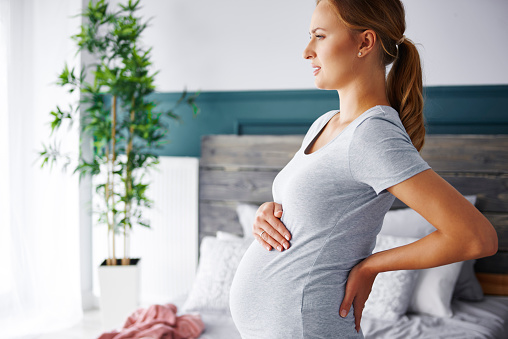
Pregnancy is a special time of immense change and growth. While this can be an exciting experience filled with joy, it’s important to remember that pregnancy is not without its common discomforts; one of the more frequent complaints during pregnancy is upper back pain. Pain in the upper back can range from mild to severe and, if left untreated, cause considerable disruption in day-to-day physical activity.

Suppose you’re experiencing any degree of upper back pain while pregnant. In that case, your optimal first step should always be consulting with your physician or experienced healthcare provider for accurate diagnosis and guidance on treatment options. Read on as we explore some potential causes behind your discomfort and tips for managing it safely.
Upper back pain is common during pregnancy.
The extra weight of the uterus can overburden your core muscles, leading to strain and tightness along the spine. This is typically felt as a dull ache that may radiate down one or both arms.
While upper back pain during pregnancy is normal, it’s important to be aware of potential danger signs. If you experience more severe pain, especially if it’s accompanied by numbness or tingling sensations, contact your healthcare provider, as this could be a sign of nerve irritation or even a slipped disk.
Disadvantages of upper back pain during pregnancy

This can include difficulty sleeping, poor posture, and reduced mobility.
You can use various strategies to reduce upper back pain during pregnancy. Here are a few of the most effective:
– Exercise regularly: Low-impact exercises such as swimming, stretching, and yoga can help strengthen your core muscles, relieve tension in the spine, and help loosen tight muscles in the upper back.
– Adopt good posture: Sitting up straight with your shoulders back and avoiding slouching can reduce stress on the spine and give you more mobility.
– Apply heat therapy: A warm compress or heating pad on your sore area can help decrease tension and relax tight muscles.
– Get adequate rest: Get enough sleep each night and occasional naps during the day to give your body time to recuperate.
– Wear supportive clothing: Wearing a supportive bra or girdle can help reduce strain on your upper back.
What are the symptoms of upper back pain during pregnancy?

The most common symptoms of upper back pain during pregnancy are aching or tightness in the middle to the upper back area. This can be experienced as just mild or severe pain, depending on the severity of the issue. Other symptoms include radiating pain from the spine, soreness, and stiffness in the neck, shoulder blades, and arms.
What are the causes of upper back pain during pregnancy?

The most common causes of upper back pain during pregnancy result from the extra weight and strain placed on the spine due to the growing baby. This can cause misalignment in the spine, resulting in tension and discomfort. Other possible causes include poor posture, weakened core muscles, stress and anxiety, and sleeping issues.
In what type of people is upper back pain common?

Upper back pain is common in pregnant women, as the extra weight and strain on the spine can cause misalignment and tension. Pregnant women are especially prone due to their changing bodies, which can increase stress levels and strain the back muscles.
Additionally, post-pregnancy women who have recently given birth may also experience upper back pain due to the added weight of carrying a newborn. People with jobs that require them to be seated for extended periods and those who are physically inactive may also be more likely to suffer from upper back pain.
Upper back pain is common during pregnancy.
The extra weight of the uterus can overburden your core muscles, leading to strain and tightness along the spine. This is typically felt as a dull ache that may radiate down one or both arms.
While upper back pain during pregnancy is normal, it’s important to be aware of potential danger signs. If you experience more severe pain, especially if it’s accompanied by numbness or tingling sensations, contact your healthcare provider, as this could be a sign of nerve irritation or even a slipped disk.
Disadvantages of upper back pain during pregnancy
This can include difficulty sleeping, poor posture, and reduced mobility. You can use various strategies to reduce upper back pain during pregnancy. Here are a few of the most effective:
– Exercise regularly: Low-impact exercises such as swimming, stretching, and yoga can help strengthen your core muscles, relieve tension in the spine, and help loosen tight muscles in the upper back.
– Adopt good posture: Sitting up straight with your shoulders back and avoiding slouching can reduce stress on the spine and give you more mobility.
– Apply heat therapy: A warm compress or heating pad on your sore area can help decrease tension and relax tight muscles.
– Get adequate rest: Get enough sleep each night and occasional naps during the day to give your body pillow time to recuperate.
– Wear supportive clothing: Wearing a supportive bra or girdle can help reduce strain on your upper back.
FAQS
What are the risks of upper back pain during pregnancy?
Upper back pain risks during pregnancy include further discomfort or injury due to weakened core muscles and misalignment in the spine.
It is important to seek medical advice if the back pain persists over a few days or worsens over time. Also, pregnant women should consult their doctor before beginning any exercise routine.
What are the treatments for upper back pain during pregnancy?
Treatments for upper back pain during pregnancy include physical therapy, massage therapy, acupuncture, and medications such as over-the-counter pain relievers.
Additionally, pregnant women should incorporate measures to ensure good posture and core strength throughout their pregnancy and use a lumbar support device to help find the right tension for their lumbar region.
Regular chiropractic adjustments can also help reduce pain and improve neck and cervical spine alignment. Regular exercises, such as yoga or swimming, are also a great way to manage back pain during pregnancy. Lastly, it is important to ensure you get enough rest each day.
What are the complications of upper back pain during pregnancy?
The potential complications of upper back pain during pregnancy include further discomfort or injury due to weakened core muscles and misalignment in the thoracic spine.
It is important to seek medical advice if the back pain persists over a few days or worsens over time. Additionally, pregnant women should always consult their doctor before beginning any exercise routine or taking medication.
What are the long-term effects of upper back pain during pregnancy?
The long-term effects of upper back pain during pregnancy are not yet well understood. However, research has suggested that chronic back pain may be a risk factor for developing musculoskeletal problems later in life.
It is important to seek medical advice if the back pain persists or worsens over time and to incorporate measures to ensure good posture and core strength throughout the pregnancy.
Additionally, regular exercise and relaxation can help to manage upper back pain during pregnancy. Finally, pregnant women should use a lumbar support device for extra support and comfort. Taking these steps makes it possible to prevent or minimize the long-term effects of upper back pain during pregnancy.
How can I manage upper back pain during pregnancy?
Upper back pain during pregnancy can be managed by taking certain preventative measures and exercising regularly. These include maintaining good posture, engaging in regular exercise (such as walking, swimming, or yoga), avoiding activities that emotional stress the back, lifting heavy objects with proper form, and proper body mechanics.
Wearing comfortable, low-heeled shoes and using a lumbar support device such as the ChiFit lumbar good lumbar support pillow Back Pain Relief Device or Physio Factory Back Posture Corrector. Additionally, be sure to get enough rest each day.
What are the resources available for upper back pain during pregnancy?
Many resources are available to help manage and prevent upper back pain during pregnancy. These include educational websites like the American Pregnancy Association, prenatal classes focusing on strengthening core muscles, and healthcare providers specializing in back pain. Various books, articles, and videos also advise relieving upper back pain during pregnancy.
Finally, many chiropractors and physical therapists offer specific treatments for back pain related to pregnancy. These may include spinal adjustments, massage, ultrasound therapy, or acupuncture.
Accessing these resources makes it possible to safely manage upper back pain during pregnancy and reduce the risk of long-term effects.
Is it normal for your upper back to hurt during pregnancy?
Yes, it is normal for your upper back to hurt during pregnancy. Many women experience temporary discomfort due to the strain of carrying extra body weight and changing center of gravity shifts.
This can cause muscle tension and misalignment in the neutral spine leading to upper back pain. However, it is important to seek medical advice if the back pain persists or worsens over time.
Additionally, taking preventative measures such as maintaining good posture and regular exercise can help ease discomfort and reduce the risk of long-term effects.
It is also important to ensure you get enough rest each day, feet flat, as this can help manage upper back pain during pregnancy.
When should I worry about upper back pain?
You should seek medical advice if the back pain persists or worsens over time, is accompanied by other symptoms such as dizziness or numbness in the arms and legs, or is too severe to manage with self-care methods.
Other signs of serious health complications include fever, chills, shortness of breath, chest pain, and difficulty urinating.
In these cases, it is important to seek medical attention as soon as possible to avoid the long-term effects of relieve upper back pain during pregnancy.
When should you worry about upper back pain during pregnancy?
You should speak with your doctor or healthcare provider if you are experiencing persistent or worsening upper back pain during pregnancy, as this could be a sign of a serious health complication. Additionally, you should seek medical attention if the pain is accompanied by other symptoms such as dizziness or numbness in the arms and legs, second and third trimesters, fever, chills, shortness of breath, foot forward, chest pain, or difficulty urinating.
These steps can help ensure a safe and healthy pregnancy progresses for you and your baby. If you have any other questions about upper back pain during pregnancy-related back pain, speak with your doctor or healthcare provider for further guidance and advice.
Don’t forget to check our article on Postpartum Self-Care
CONCLUSION
If you’re dealing with upper back pain during pregnancy, there are a few things you can do to get some relief. First, try gentle stretching and massaging the area. You can also apply heat or ice to the affected area for 10-15 minutes. You may consult your doctor for additional treatment options for severe pain. Many women experience upper back pain during pregnancy. With some simple self-care measures, you can hopefully find some relief from your symptoms.
